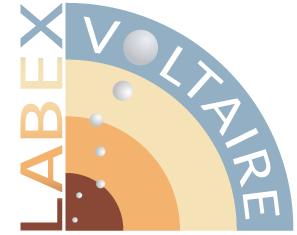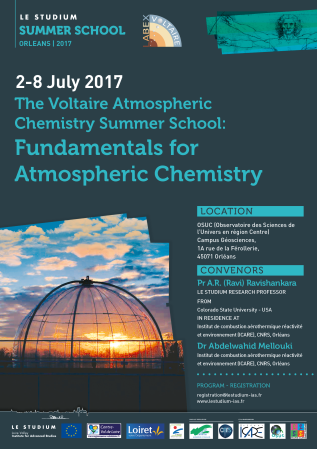The Voltaire Atmospheric Chemistry Summer School: Fundamentals for Atmospheric Chemistry
ICARE (Institut de combustion aérothermique réactivité et environnement)
1C Avenue de la Recherche Scientifique
45071 Orléans Cedex 2
France
Presentation
REGISTRATION CLOSED
Accommodations and meals for all attendees will be provided for the days of the school.
GOAL OF THE COURSE
The goal of the course is to familiarize the participants (expected to be Ph.D. or Masters students and post-docs) entering the field of atmospheric in the fundamentals that are crucial for practicing atmospheric chemistry research. It is a refresher of the basics of thermodynamics, chemical kinetics, spectroscopy, photochemistry, and heterogeneous chemistry required to work in the areas of air quality, climate change, and ozone layer depletion. It is aimed providing an initial survey followed by building on the basics. The applications of these fundamentals will be exemplified with current environmental issues.
CONVENORS
- Pr A.R. (Ravi) Ravishankara, LE STUDIUM RESEARCH PROFESSOR
- FROM: : Colorado State University - USA
IN RESIDENCE AT: Institut de combustion aérothermique réactivité et environnement (ICARE), CNRS, Orléans - Dr Abdelwahid Mellouki
Institut de combustion aérothermique réactivité et environnement (ICARE), CNRS, Orléans
EXPECTED OUTCOMES
-
Familiarity with the use of the fundamentals in atmospheric research on air quality, climate change, and ozone layer depletion.
-
Ability to understand research papers dealing with these issues.
-
Ability to apply the basic knowledge of these fundamental to carry out laboratory studies, field measurements, and modeling of atmospheric chemistry related to issues that include air quality, climate change, and ozone layer depletion.
Even though the student/post-doctoral fellows may not necessarily work specifically on these environmental issues, they will learn how these fundamentals are used in atmospheric chemistry research.
CONTENTS OF THE COURSE
Introduction:
Why do we study atmospheric chemistry? Provide a glimpse at the policies behind the three key atmospheric chemistry issues of today. Appreciation of how the fundamentals of the atmospheric chemistry help us study and solve environmental problems.
Thermodynamics:
Concepts of enthalpy, entropy, free energy, equilibria and the relationships between these quantities. Ability to calculate these quantities for atmospheric reactions and knowledge of the sources of thermodynamic data.
Kinetics:
Basics of gas phase kinetics of unimolecular, bimolecular, and termolecular reactions. Ability to find kinetics data, judge the uncertainties in the kinetics parameters, and being familiar with how uncertainties are expressed in evaluations. Ability to understand how the kinetics parameters are measured and assessed to obtain the best values and their uncertainties. The course will provide familiarity with the IUPAC and NASA/JPL evaluations of reaction rate data, and how to use these evaluated data.
Spectroscopy:
Very basics of ro-vibrational and electronic spectra. Knowledge of spectral data. Use of HITRAN data base. Familiarity with sources of spectral data for electronic transitions. Use of spectroscopic methods to measure atmospheric constituents.
Photochemistry:
Basic knowledge of photochemical principles. Beer-Lamberts Law. Absorption cross sections and quantum yields. Ability to calculate J-values and estimate their uncertainties. Knowledge of sources of data on absorption cross sections, quantum yields, and solar radiation fluxes.
Heterogeneous and multiphase Chemistry:
Basics of gas-solid and gas-liquid interactions. How to interpret atmospheric heterogeneous processes. Uptake coefficients, their measurements, their utility, and their limitations. Solid and liquid phase reactions. How to calculate reactive and non-reactive uptake in of atmospheric constituents under atmospheric conditions.
Environmental issues that will be discussed and used to exemplify the fundamentals:
Air quality:
What are the issues regarding ozone and other criteria pollutants? Specifics about PM. Examples of air quality issues and calculations that emphasize the basics noted above.
Climate Change:
What are the issues regarding climate change and atmospheric chemistry? Specifics about greenhouse gases, their lifetime, and ability to calculate relative potency of greenhouse gases. Role of aerosols in climate and how to understand their role.
Ozone Layer Depletion:
What is ozone layer depletion? What is its history? What is the chemistry behind it? Descriptions of the use of above basics in dealing with the ozone layer depletion issue.
In addition to the lectures, there will be sessions devoted to hands-on experiences in solving problems. These sessions will be done in groups and there will be opportunities to compare approaches and discuss the results.
SPEAKERS
- Dr Steven Brown : NOAA, Boulder – USA
- Pr Valery Catoire : LPC2E, Orléans – France
- Pr Jianmin Chen : FDU, Shanghai – China
- Dr Christian George : IRCELYON, Lyon – France
- Pr Hartmut Herrmann : TROPOS, Leipzig – Germany
- Dr Abdelwahid Mellouki : ICARE, Orléans – France
- Pr Bénédicte Picquet-Varrault : LISA, Paris – France
- Pr A.R. Ravishankara : ICARE, Orléans – France
Programme
MONDAY , JULY 3RD
- 9:00-10:30
Course 1: fundamentals
Course 2: Basics atmospheric properties and meteorology - Dr Abdelwahid Mellouki (ICARE, France) - 11:00-12:30
Course 3: Kinetics of atmospheric reactions - Pr Bénédicte Picquet-Varrault (LISA – France) - 14:00-15:30
Collective Exercise A: for courses 3 - 16:00-17:30
Course 4: Thermodynamics of atmospheric reactions - Dr Steven Brown (NOAA, Boulder – USA)
TUESDAY, JULY 4TH
- 9:00-10:30
Collective Exercise B: Course 4 - 11:00-12:30
Course 4: Spectroscopy of atmospheric constituents - Pr Valery Catoire (LPC2E – France) - 14:00-15:30
Collective Exercise C: Course 5- Spectroscopy - 16:00-17:30
Course 6: Photochemistry of atmospheric constituents - Pr A.R. Ravishankara (ICARE – France)
WEDNESDAY, JULY 5TH
- 9:00-10:30
Collective Exercise D: Photochem and J value - 11:00-12:30
Course 7: Hetterogeneous Chemistry - Dr Christian George (IRCELYON – France) - 14:00-15:30
Collective Exercise E Course 7 - 16:00-18:00
Lab tour
THURSDAY, JULY 6TH
- 9:00-10:30
Course 8: multiphase chemistry - Pr Hartmut Herrmann (TROPOS – Germany) - 11:00-12:30
Collective Exercise F: Multiphase chemistry - 14:00-21:30
LE STUDIUM Thursday at Hotel Dupanloup by Pr A.R. Ravishankara (ICARE – France)
Wine & cheese cocktail
FRIDAY, JULY 7TH
- 9:00-12:30
Course 9: Application to Ozone layer Pr A.R. Ravishankara (ICARE – France)
Course 10: Application to climate change - Pr A.R. Ravishankara (ICARE – France)
Course 11: Application to Air quality - Pr Jianmin Chen (FDU – China) - 14:00-15:30
Poster session - 16:00-17:30
Discussion and Summary
SATURDAY, JULY 8TH
Departure











